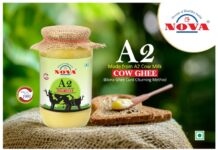Last month, a new PSA-style ad dropped featuring Queen Latifah speaking out on the very serious subject of…people judging other people for drinking cow’s milk. If it sounds like an SNL sketch, that might be because two of the creatives who worked on the campaign are actual alumni of the comedy show. It’s not the first time in recent memory that Big Dairy has utilized accomplished writers and celebrity endorsements to try to salvage their public image. You may remember the satirical “Wood Milk” ads from earlier this year, starring fan-favorite Aubrey Plaza. In it, non-dairy milk alternatives are unflatteringly compared to literal wood, ending with some snappy copy that asserts “only real milk is real.” Other celebrities, like Emma Roberts, have been enlisted by the dairy industry as well to sell cow’s milk and disparage competing products. And though the ads tend to be glossy, well-written, and adeptly delivered by beloved comedians, there’s one takeaway that I can’t ignore: Big Dairy is getting desperate.
The Queen Latifah ad addresses the concept of “milk shaming,” the practice of judging someone for drinking dairy milk instead of one of the many alternatives now widely available. The gag mission statement, as stated by Queen Latifah, is to “make milk-shaming a thing of the past.” Sure, it’s kind of funny — it touches on a mundane but apparently relatable experience: feeling judged for a slightly old fashioned or out-of-touch preference. It’s a phenomenon that Winston Binch, chief brand and experience officer of the agency behind the campaign, calls “comically absurd.” The corporation paying for both the Aubrey Plaza and Queen Latifah campaigns is MilkPEP, also known as the National Fluid Milk Processor Promotion Program, a government-administered program within the USDA that seeks to promote the sale and consumption of dairy milk. So, yes, the U.S. government, working in the interests of the dairy industry, is spending a good deal of money to convince folks that drinking milk is totally fine — and maybe even cool, just like your favorite celebrities.
But while it may elicit a chuckle, any viewer with a modicum of media literacy could tell you that these ads offer no real evidence or reason to choose dairy. Consider that people are drinking less dairy milk — about 2 to 2.5% annually — while the non-dairy plant milk market, globally, is expected to triple in valuation by 2030. Neither the Wood Milk nor Milk Shaming ads address any of the reasons why people are switching to non-dairy milk, or why they may raise eyebrows at folks who haven’t. Maybe they’re not trying to make a serious case for drinking dairy because they know that there isn’t one. And as fictional advertising mogul Don Draper taught us, “If you don’t like what they’re saying, change the conversation.” So Big Dairy is trying to change the conversation: Celebrities! Don’t judge us! …Everything else tastes like wood? They’re simply not addressing the reasons many people are cutting back or abstaining from dairy, ranging from personal health to animal ethics to environmental concerns.
It’s fairly commonly understood nowadays that the milk most of us drink is not coming from an idyllic, family-owned farm where animals are loved and cared for. It’s coming from an industry dominated by factory farms that are gradually gobbling up small competitors. According to USDA estimates, about 70% of American milk comes from farms with at least 500 cows. Many industrial dairy operations are much, much bigger than that, with populations running into the tens of thousands. These cows are kept perpetually impregnated so that they will consistently produce milk, though they don’t get to care for their calves. They are generally kept inside for their entire lives, not permitted to graze, and forced to excrete waste right in their small, allotted living space. Their tails are docked without anesthetic, and they’re killed after 4-6 years despite having a natural lifespan of closer to 20, largely due to the squalid living conditions, arduous land travel, and the lack of ability to form normal social relationships with one another. According to the reports published in dairynews7x7.com .
And even if you don’t find animal cruelty a compelling reason to dump dairy, there’s another big one that none of us can escape: environmental destruction. Factory farms are responsible for the emission of greenhouse gases hundreds of times more powerful than carbon dioxide, a major contributor to causes for climate change. They require massive amounts of land and water, not just for the dairy farms themselves, but for the farms growing soy and corn as cow feed. And they leach toxic pollutants like ammonia and hydrogen sulfide into the air and water, all of which not only destroys ecosystems and threatens biodiversity, but poses potential serious health effects to humans as well.



















![Poolani Milk Cooperative Society [PMCS] well-established and fastest-growing in the Dairy Sectorof RuralKerala](http://thedairytimes.com/wp-content/uploads/2024/04/1-218x150.jpg)









![Poolani Milk Cooperative Society [PMCS] well-established and fastest-growing in the Dairy Sectorof RuralKerala](http://thedairytimes.com/wp-content/uploads/2024/04/1-100x70.jpg)

